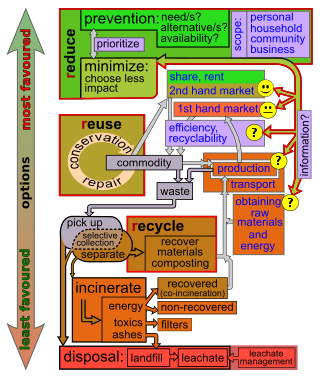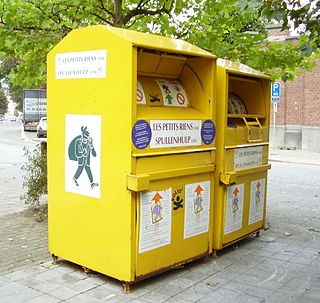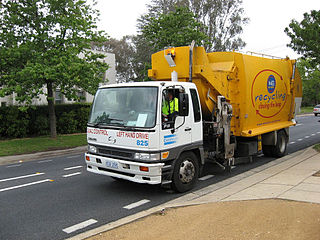
Recycling is the process of converting waste materials into new materials and objects. This concept often includes the recovery of energy from waste materials. The recyclability of a material depends on its ability to reacquire the properties it had in its original state. It is an alternative to "conventional" waste disposal that can save material and help lower greenhouse gas emissions. It can also prevent the waste of potentially useful materials and reduce the consumption of fresh raw materials, reducing energy use, air pollution and water pollution.

A charity shop (British English), thrift shop or thrift store or opportunity shop or op-shop is a retail establishment run by a charitable organization to raise money. Charity shops are a type of social enterprise. They sell mainly used goods such as clothing, books, music albums, shoes, DVDs, toys, and furniture donated by members of the public, and are often staffed by volunteers. Because the items for sale were obtained for free, and business costs are low, the items can be sold at competitive prices. After costs are paid, all remaining income from the sales is used in accord with the organization's stated charitable purpose. Costs include purchase and/or depreciation of fixtures, operating costs and the building lease or mortgage.

Savers, Inc. headquartered in Bellevue, Washington, U.S., is a privately held for-profit thrift store retailer offering second hand merchandise. An international company, Savers has more than 315 locations throughout the United States of America, Canada, and Australia, and receives its merchandise by paying money to non-profit organizations for donated clothing and household items. Savers is known as Value Village in the Pacific Northwest, the Baltimore metropolitan area, and most of Canada, and Village des Valeurs in Quebec. Chicago stores and some locations in the Washington, DC metropolitan area are under the name Unique. In Australia and other regions of the U.S., the stores share the corporation's name.

Ship-breaking is a type of ship disposal involving the breaking up of ships for either a source of parts, which can be sold for re-use, or for the extraction of raw materials, chiefly scrap. Modern ships have a lifespan of 25 to 30 years before corrosion, metal fatigue and a lack of parts render them uneconomical to operate. Ship-breaking allows the materials from the ship, especially steel, to be recycled and made into new products. This lowers the demand for mined iron ore and reduces energy use in the steelmaking process. Fixtures and other equipment on board the vessels can also be reused. While ship-breaking is sustainable, there are concerns about the use by poorer countries without stringent environmental legislation. It is also labour-intensive, and considered one of the world's most dangerous industries.

Zero waste is a set of principles focused on waste prevention that encourages redesigning resource life cycles so that all products are repurposed and/or reused. The goal of the movement is to avoid sending trash to landfills, incinerators, oceans, or any other part of the environment. Currently, only 9% of global plastic is recycled. In a zero waste system, materials are reused until the optimum level of consumption is reached.

In the context of physical construction, deconstruction is the selective dismantlement of building components, specifically for reuse, repurposing, recycling, and waste management. It differs from demolition where a site is cleared of its building by the most expedient means. Deconstruction has also been defined as "construction in reverse". Deconstruction requires a substantially higher degree of hands-on labor than does traditional demolition, but as such provides a viable platform for unskilled or unemployed workers to receive job skills training. The process of dismantling structures is an ancient activity that has been revived by the growing fields of sustainable and green building.

Reuse is the action or practice of using an item, whether for its original purpose or to fulfill a different function. It should be distinguished from recycling, which is the breaking down of used items to make raw materials for the manufacture of new products. Reuse – by taking, but not reprocessing, previously used items – helps save time, money, energy and resources. In broader economic terms, it can make quality products available to people and organizations with limited means, while generating jobs and business activity that contribute to the economy.

Woolworths Holdings Limited is a South African multinational retail company that owns the South African retail chain Woolworths, and Australian retailer Country Road Group. Woolworths, however, has no association to Australia's Woolworths supermarket chain.

Waste minimisation is a set of processes and practices intended to reduce the amount of waste produced. By reducing or eliminating the generation of harmful and persistent wastes, waste minimisation supports efforts to promote a more sustainable society. Waste minimisation involves redesigning products and processes and/or changing societal patterns of consumption and production.
There is no national law in the United States that mandates recycling. State and local governments often introduce their own recycling requirements. In 2014, the recycling/composting rate for municipal solid waste in the U.S. was 34.6%. A number of U.S. states, including California, Connecticut, Delaware, Hawaii, Iowa, Maine, Massachusetts, Michigan, New York, Oregon, and Vermont have passed laws that establish deposits or refund values on beverage containers while other jurisdictions rely on recycling goals or landfill bans of recyclable materials.

Textile recycling is the process of recovering fiber, yarn, or fabric and reprocessing the material into new, useful products. Textile waste is split into pre-consumer and post-consumer waste and is sorted into five different categories derived from a pyramid model. Textiles can be either reused or mechanically/chemically recycled.

Upcycling, also known as creative reuse, is the process of transforming by-products, waste materials, useless, or unwanted products into new materials or products perceived to be of greater quality, such as artistic value or environmental value.

Sustainable fashion is a term describing products, processes, activities, and people that aim to achieve a carbon-neutral fashion industry built on equality, social justice, animal welfare, and ecological integrity. Sustainable fashion concerns more than fashion textiles or products, rather addressing the entire process in which clothing is produced, consumed and disposed of. The movement looks to combat the large carbon footprint that the fast fashion industry has created by reducing the environmental impact such as air pollution, water pollution and climate change.
Casa Mesita refers to two separate non-profit organizations in Los Alamos, New Mexico. Casa Mesita Thrift Shop and Casa Mesita Group Home are two of many social enterprise organizations in Los Alamos County, one of the highest-income counties in the United States, in a state with household income far below the national median.

Waste are unwanted or unusable materials. Waste is any substance discarded after primary use, or is worthless, defective and of no use. A by-product, by contrast is a joint product of relatively minor economic value. A waste product may become a by-product, joint product or resource through an invention that raises a waste product's value above zero.
Paint is a recyclable item. Latex paint is collected at collection facilities in many countries and shipped to paint-recycling facilities.
Recycling can be carried out on various raw materials. Recycling is an important part of creating more sustainable economies, reducing the cost and environmental impact of raw materials. Not all materials are easily recycled, and processing recyclable into the correct waste stream requires considerable energy. Some particular manufactured goods are not easily separated, unless specially process therefore have unique product-based recycling processes.
Products made from a variety of materials can be recycled using a number of processes.
Recycling Lives Limited, formerly Recycling Co Ltd and Preston Recycling Ltd, is a British recycling and waste management company headquartered in Preston, Lancashire. It has over 200 employees and £25 million turnover. The company founded a social welfare charity, Recycling Lives Charity, and is committed to undertaking only commercial ventures with a demonstrable charity or community benefit.

Recycling in Australia is a widespread, but not a comprehensive part of waste management in Australia. Recycling occurs through commingled kerbside recycling collections, drop-off programs, and various other schemes. Collection and management of household recycling typically falls to local councils, with private contractors collecting commercial and industrial recycling. In addition to local councils, legislation and overarching policies are implemented and managed by the state and federal governments.














